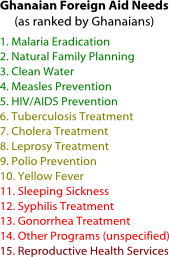29 November 2007 Vol. 9 / No. 44
Dear Colleague,
The evidence overwhelmingly suggests that the supposed beneficiaries of reproductive health programs are clamoring for anything but "reproductive health care." It is only by arrogantly rejecting the real health and other needs of poor women-as the women themselves express them-that priority can be given to fertility control.
Steven W. Mosher
What Women Want
(Hint: Not Reproductive Health Care)
Pat McEwen was visiting the small village of Huaca, high in the Andes Mountains of Ecuador. The village, not far from the Colombian border, was teeming with refugees fleeing from the ongoing battles between government forces and the drug lords. Mostly women and children, the refugees had arrived with only the possessions that they could carry. Many had lost husbands, sons and daughters to the conflict. "They had been poor even before the violence destroyed their villages," Pat recalled. "Now they had lost everything and [were] the ‘poorest of the poor.’" These refugee women, in short, were perfect examples of the kind of "client" that the family planners would say needed "reproductive health services."
Pat decided to ask the group of 42 refugee women that she was meeting with three simple questions: "What are the things you worry about most often? What are your greatest needs? What can I do to help you the most?" Their worries centered around their children, their husbands, and family members from whom they had become separated. Their most pressing need was for blankets and warm clothes. Second was a way to provide for their families. A close third was medicine or health care for their children. Not one mentioned family planning.
Pat then went right to the heart of the "reproductive health care" controversy. " "If I could provide a way for you to have fewer children, or no more children, or to not be pregnant if you are pregnant, would you be interested?" she asked them. The atmosphere in the room, pleasant up to that point, instantly turned chilly. The women whispered among themselves, shooting Pat looks that were no longer friendly. Then one woman, her voice rising in indignation, spoke for all: "Sabe nada, estupida Americana!" Up to this point in the interview, Pat had been relying on translators to help with her halting Spanish, but this stinging barb came through loud and clear: "You understand nothing, stupid American!"
These refugee women had no use for contraceptives, sterilizations, or abortions and rejected Pat’s offer of "reproductive health care" out of hand. "The reproductive ‘right’ that these refugee women wanted was the right not to have me or anyone else interfere in their reproductive lives," Pat recalled later. "They understood that more children meant more minds to plan the future, more hands to share the work, and more hearts to share joy and sorrow. These women had lost family members to violent deaths, but they understood that their children were the promise that there would still be a tomorrow."
Pat McEwen’s encounter with the refugee women of Ecuador is corroborated by broader surveys of the real health needs of real women and men that PRI has carried out in the developing world. Who wants reproductive health care? Not the people of Ghana, according to a 2001 survey carried out by PRI in the metropolitan port city of Takoradi.
A total of 397 individuals of both sexes were interviewed by one of four trained interviewers on one of Takoradi’s main thoroughfares, selected at random from the constant stream of passersby. Those interviewed were shown a list of 15 different health programs, and asked to rank order the list in terms of their own personal needs, putting their most pressing need first and their least important need last. The health programs listed were: Malaria Eradication, Leprosy Treatment, Reproductive Health, Syphilis Treatment, Polio Prevention, Clean Water Programs, Natural Family Planning, Sleeping Sickness, Gonorrhea Treatment, Tuberculosis Treatment, Yellow Fever, HIV/AIDS Prevention, Cholera Treatment, Measles Prevention, and Other Programs (unspecified).
What do these modern Africans have to say about their health care needs? They list their most pressing concerns as Malaria Eradication, Natural Family Planning, Clean Water, Measles Prevention, and HIV/AIDS Prevention. Now malaria, measles and HIV/AIDS are all diseases which run at epidemic, or near-epidemic, levels in Ghana, confirming the good judgment of those we surveyed. Ghanaians are also aware that polluted drinking water is a vector for the transmission of cholera and other diseases, and so would like to see the water supply made safe. The only mild surprise in this cluster of top-ranked health needs is the presence of NFP, which was welcomed by many respondents as a safe and natural means of regulating their fertility.
Not surprisingly, Ghanaians want assistance with real diseases, not reproductive health services.
Second-order health needs listed included Tuberculosis Treatment, Cholera Treatment, Leprosy Treatment, Polio Prevention, Yellow Fever, Sleeping Sickness, and Syphilis and Gonorrhea treatment. These are all diseases that, although not affecting the large percentage of the population that, say, HIV/AIDS does, are nonetheless endemic to Ghana. Here again, the views of those we spoke with accord well with Ghana’s epidemiological realities.
Reproductive health care came in dead last. Even the unspecified "Other Programs" came in higher, suggesting that the Ghanaians would prefer almost any kind of health care to the kind of programs that they have been force-fed the past few decades. This disdain is further underlined in the "comments" section, where one reads such remarks as "Stop reproductive health; it’s not good," "We don’t need reproductive health programs." "Stop reproductive health; eradicate malaria," and so on.
Bear in mind that those with whom we spoke were not backward, tribal people, but highly westernized and educated residents of one of Ghana’s most modernized cities. The residents are small shop owners and tradesmen, mechanics and other service providers, and agricultural proprietors and workers. Most of the inhabitants have received some education, and literacy rates are high. Why, then, should their views on their own health care needs, including their rejection of so-called reproductive health care, not be taken seriously in planning foreign aid programs?
Population control organizations find it highly inconvenient that their programs are not greeted with joy by their "targets," and they go to great lengths to disguise or explain away this fact. Overseas, they work overtime to create the impression of robust popular and government support for their anti-natal programs. However, this facade falls away in discussions with donors, in which they arrogantly suggest that the women’s reluctance to contracept comes about because they either don’t know their own minds, or because they simply don’t know what’s good for them (or their country, or the environment, etc.)
To suggest that a woman does not know her own mind in such a private and important matter as childbearing is, at the very least, patronizing.
To deal with this perceived problem, population controllers have contrived the concept of "latent demand," and the related concept of "unmet need." "Latent demand" means that, while a woman has a supposedly obvious need for a modern contraceptive, she is kept from demanding it by ignorance, fear, or superstition. Consequently, an "unmet need" is the percentage of women in a given country who are said to have a "need" for modern contraceptives that is not being "met."
How do USAID and other population control agencies arrive at the number of women in a given country who have an "unmet need" to be contracepted or sterilized? Certainly not, as the term itself suggests, by respectfully asking a representative sample of women about their actual contraceptive needs. Rather, the "unmet need" for modern contraceptives is circuitously inferred from survey questionnaire data as the percentage of women who (1) say they wish to delay the birth of their next child, or who want no more children, and who also (2) say they are not using modern means of contraception.
It is surely no accident that each and every one of the methodological shortcomings of determining "unmet need" and "latent demand" strengthens the case for population control by inflating the percentage of women in developing countries who are said to require the services of the controllers. "Unmet need," like "latent demand," is nothing more than a self-serving verbal dodge, used by the controllers to justify their budgets and design their programs, furthering the pretence that, in so doing, they are but serving the "deepest" needs of womankind.
If this sounds too harsh, consider how the controllers would behave if they were truly interested in meeting the reproductive health needs of women, as women themselves understand them. Their way forward would be simple and straightforward. They would merely have to ask women how many children they wished to have, and then provide the necessary maternal and infant health care programs necessary to safely achieve that number. Surveys show that parents throughout the developing world, just like parents from wealthy countries, have pronounced views on their own "desired family size." So these numbers would be easy to obtain.
What this means is that the controllers cannot, at one and the same time, pursue their anti-natal agenda and respect the fertility desires of women in the developing world. There is simply no way to reconcile these two mutually antagonistic goals. Instead, they serve the first, and pay lip service to the second. They invent spurious measures of flawed design which supposedly reflect the reproductive health needs of women but which are actually calculated to serve an anti-natal agenda. The alternative is, for them, quite unthinkable. For if the controllers were to relax their relentless efforts at fertility control, and begin to truly serve the reproductive health needs of women, the denizens of the developing world would fall into what they would regard as an uncontrolled frenzy of breeding.
Modern controllers are careful to hide their anti-natal agenda behind concepts such as "latent demand," "unmet need", and "reproductive health care." Occasionally the mask slips, however. PRI investigator Joseph Meaney, visiting a UN refugee camp in Albania in 1999, was struck by the fact that many of the Kosovo refugee women he was speaking to were eager to have more children, in part to make up for those they had lost to Serbian atrocities. When he mentioned this to a UNFPA doctor, the man exploded with distain for his charges: "They’re refugees, don’t you see! They can’t have children!
Who are we to tell the poor women of the world that they cannot have more children? This is not reproductive health. This is reproductive oppression, and the women from these developing nations recognize it for what it is: an assault on their fertility and ultimately, their race. We should give the poor nations of the world primary health care, not ideological imperialism.
Colin Mason is the Director for Media Production at PRI.







